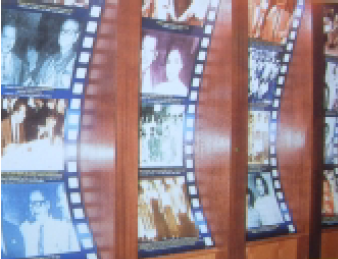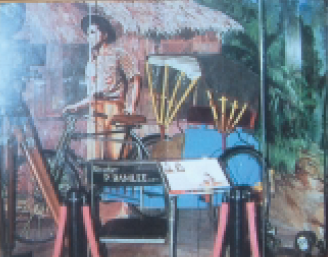Virtually no one will recognise the name ‘Teuku Zakaria bin  Teuku Nyak Puteh.’ But mention P. Ramlee (‘P’ for Puteh) and they will readily acknowledge him as the quintessential Malay entertainer par excellence. The late Tan Sri P. Ramlee (1929 – 1973), who adopted this stage name, won admiration from all over as an actor, composer, singer, and movie director. Even today, young and old enjoy Ramlee’s works, with his Malay movies commanding reruns on national television and elsewhere in Asia and Europe.
Teuku Nyak Puteh.’ But mention P. Ramlee (‘P’ for Puteh) and they will readily acknowledge him as the quintessential Malay entertainer par excellence. The late Tan Sri P. Ramlee (1929 – 1973), who adopted this stage name, won admiration from all over as an actor, composer, singer, and movie director. Even today, young and old enjoy Ramlee’s works, with his Malay movies commanding reruns on national television and elsewhere in Asia and Europe.
In recognition of his contribution to the Malaysian heritage, Ramlee was posthumously awarded the ‘Tan Sri’ title, along with two roads named after him – one in Penang (formerly Caunterhall Road) and one in Kuala Lumpur (formerly Jalan Parry). But despite the fame he attained, Ramlee (born to a poor family in Penang on Hari Raya day, March 1929) remained a humble person throughout his career.
 Ramlee’s education began at Sekolah Melayu Kampung Jawa, before moving on to the Francis Light Institution, and finally the Penang Free School. It was obvious that as a child, Ramlee often clowned or mimicked. In school, Ramlee’s jokes kept his classmates in stitches, and he was often selected as a bilal to lead prayers at mosques. In sports, Ramlee was active in soccer, sepak takraw, and badminton. But it was music – the violin in particular – that Ramlee had a penchant for.
Ramlee’s education began at Sekolah Melayu Kampung Jawa, before moving on to the Francis Light Institution, and finally the Penang Free School. It was obvious that as a child, Ramlee often clowned or mimicked. In school, Ramlee’s jokes kept his classmates in stitches, and he was often selected as a bilal to lead prayers at mosques. In sports, Ramlee was active in soccer, sepak takraw, and badminton. But it was music – the violin in particular – that Ramlee had a penchant for.
Ramlee mingled well with society, picking up many local dialects. During World War II when the Japanese occupied what was then Malaya, Ramlee even obtained a diploma in Japanese language proficiency from the Japanese Boys’ Brigade. It was during these trying times that Ramlee’s musical abilities blossomed. After the end of the war in 1945, Ramlee formed several bands, the first being ‘Pancaragam Sinaran Bintang,’ followed by ‘Orkes Mutiara Pulau Pinang,’ and ‘Tenora Sekampung Band.’
He took part in various competitions until his classic song ‘Azizah’ took first place. It was the beginning of a new era for Ramlee. Talent scouts like the Shaw Brothers and local producer Datuk L. Krishnan were soon offering him singing and acting roles, and after a stint as a playback singer in Singapore for the film ‘Cinta’ in 1948, Ramlee made his movie debut in ‘Nasib’ the following year.
After starring in a further 20 box-office movies, Ramlee directed ‘Penarek Beca’ in 1955. Largely influenced by the works of foreign directors like Satyajit Ray of India and Akira Kurosawa of Japan, a year later his film ‘Hang Tuah’ won the best musical in the Third Asian Film Festival in Hong Kong. Ramlee went on to win the Best Actor Award at the Asian Film Festival in 1957 for dual roles in ‘Anakku Sazali.’
When Singapore separated from Malaysia in 1965, Ramlee moved base to Kuala Lumpur, producing another 22 films before his death on May 29, 1973. Ramlee died a legend, singing, writing, and scoring the music and lyrics for about 200 songs that appeared in a total of 63 films. For more information, visit the P. Ramlee Memorial at 22 Jalan Dedap, Taman P. Ramlee (Tel: 03 – 4023 1311).
This article has been edited for ExpatGomalaysia.com
Get your free subscription and free delivery of The Expat Magazine.
"ExpatGo welcomes and encourages comments, input, and divergent opinions. However, we kindly request that you use suitable language in your comments, and refrain from any sort of personal attack, hate speech, or disparaging rhetoric. Comments not in line with this are subject to removal from the site. "




















